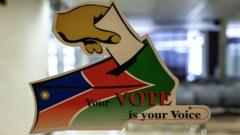The electoral landscape in Africa is undergoing a profound transformation as incumbent parties, like Namibia's Swapo and Botswana's BDP, face severe electoral setbacks. A combination of economic decline and a growing public demand for accountability is reshaping democratic engagement across the region.
Shifts in the Political Landscape: Africa's Incumbents Face Electoral Backlash

Shifts in the Political Landscape: Africa's Incumbents Face Electoral Backlash
Sub-Saharan Africa witnesses a significant wave of opposition successes as citizens demand accountability, challenging long-standing governing parties amid economic frustrations and rising public intolerance for corruption.
Despite Swapo retaining power for over 30 years in Namibia, the party's grip has weakened as it garnered only 57% of the vote in the recent presidential elections, which were marred by logistical issues and irregularities. The situation reflects a broader trend across sub-Saharan Africa in 2024, where government parties have struggled at the polls. Several elections this year resulted in significant losses for ruling parties, signaling a shift in voter sentiment fueled by economic hardship, rampant corruption, and the emergence of organized opposition groups.
The elections in Botswana stand out, where the long-ruling Botswana Democratic Party (BDP) faced a dramatic defeat, being reduced from 38 seats to just four in Parliament. Similarly, in Mauritius, the governing Alliance Lepep coalition suffered a substantial blow, winning only 27% of the vote. In Senegal, amidst political turmoil, opposition candidates secured victories against ruling parties accused of abusing power.
Even in South Africa, where the African National Congress (ANC) maintained power, it dropped below 50% support for the first time since the end of apartheid, leading to a coalition government that diminished its political clout. These developments contrast sharply with the region's history of entrenched leadership, as more voters express dissatisfaction with corrupt governance and economic mismanagement.
Public anger over rising living costs and high taxes, seen in recent protests across Kenya, epitomizes the frustration that has driven citizens to the polls. Similar patterns resonate globally, indicating a broader discontent with economic conditions impacting governments in various countries. However, Africa's recent electoral shifts highlight a resilience toward democracy, as opposition parties successfully rally citizens and demand accountability in ways that differ from historical norms.
As the political environment evolves, the potential for change may also threaten future elections in countries like Ghana and Malawi, as the citizenry continues to clamor for effective governance. These recent electoral dynamics suggest a notable adaptability and commitment to democracy in sub-Saharan Africa, offering valuable lessons for global observers on the potential for political resurgence, even amid prevailing authoritarianism in other parts of the world.
The elections in Botswana stand out, where the long-ruling Botswana Democratic Party (BDP) faced a dramatic defeat, being reduced from 38 seats to just four in Parliament. Similarly, in Mauritius, the governing Alliance Lepep coalition suffered a substantial blow, winning only 27% of the vote. In Senegal, amidst political turmoil, opposition candidates secured victories against ruling parties accused of abusing power.
Even in South Africa, where the African National Congress (ANC) maintained power, it dropped below 50% support for the first time since the end of apartheid, leading to a coalition government that diminished its political clout. These developments contrast sharply with the region's history of entrenched leadership, as more voters express dissatisfaction with corrupt governance and economic mismanagement.
Public anger over rising living costs and high taxes, seen in recent protests across Kenya, epitomizes the frustration that has driven citizens to the polls. Similar patterns resonate globally, indicating a broader discontent with economic conditions impacting governments in various countries. However, Africa's recent electoral shifts highlight a resilience toward democracy, as opposition parties successfully rally citizens and demand accountability in ways that differ from historical norms.
As the political environment evolves, the potential for change may also threaten future elections in countries like Ghana and Malawi, as the citizenry continues to clamor for effective governance. These recent electoral dynamics suggest a notable adaptability and commitment to democracy in sub-Saharan Africa, offering valuable lessons for global observers on the potential for political resurgence, even amid prevailing authoritarianism in other parts of the world.



















